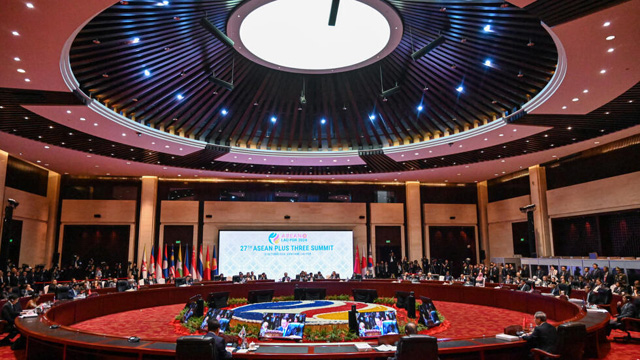
VIENTIANE, Oct 11, 2024 (BSS/AFP) - Asian leaders and the top diplomats of adversaries the United States and Russia gathered Friday in Laos to discuss a world in turmoil, with China facing further fire over its actions in contested regional waters.
The usually tranquil, temple-lined streets of the landlocked nation's capital Vientiane have been briefly transformed into a hub of global diplomacy for the annual East Asia Summit, on the heels of meetings of the 10-country ASEAN regional bloc.
The summit marks a rare occasion when the United States and Russia, both represented by their top diplomats, are sitting together in the same room.
US Secretary of State Antony Blinken met with Southeast Asian leaders ahead of the summit and urged firmness against Russia's "war of aggression in Ukraine", which he said violated the principles of both ASEAN and the United Nations.
Blinken was not expected to meet one-on-one with Russian Foreign Minister Sergei Lavrov, with the US administration doubting Moscow's sincerity in its calls for talks on the Ukraine war.
Vice President Kamala Harris, seeking the White House in next month's election, has made clear she will not negotiate with Russia without involvement by Ukraine's government.
- China tensions –
The annual East Asia Summit rarely produces major breakthroughs, but divisions are expected to be especially pronounced this year due to disagreements over Ukraine, the Middle East and China.
A day after Philippine President Ferdinand Marcos directly challenged China over violent incidents in the dispute-laden South China Sea, Blinken said the United States was committed to defending freedom of navigation.
"We remain concerned about China's increasingly dangerous and unlawful actions on the South and East China Seas, which have injured people, harmed vessels from ASEAN nations and contradict commitments to peaceful resolution of disputes," Blinken told ASEAN leaders.
The summit marked the diplomatic debut of Japan's security-minded new Prime Minister Shigeru Ishiba, who in the past has called for a NATO-style Asian pact with an unstated goal of deterring China.
Japan's foreign ministry said Friday that Ishiba reiterated "serious concerns" about the "intensification of Chinese military activities in areas surrounding Japan" in a meeting with Premier Li Qiang.
Li made a veiled swipe at Ishiba during an ASEAN-related meeting on Thursday, warning of the danger of "attempts to introduce bloc confrontation and geopolitical conflicts into Asia".
Tensions have also risen again over Taiwan, where President Lai Ching-te vowed Thursday to "resist annexation" by Beijing, which claims the self-governing democracy.
China lashed out at Lai's speech. Blinken told ASEAN that the United States wanted to "protect stability across the Taiwan Strait".
Tensions between China and the United States, however, have eased markedly over the past year, with President Joe Biden supporting dialogue to avoid full-out confrontation.
Thailand separately has led efforts at the summit to seek a diplomatic resolution on violence in military-ruled Myanmar, which for the first time in more than three years sent a representative to an ASEAN meeting.
Myanmar's delegation attended the talks with Blinken, who has urged no let-up in pressure until the junta, which seized power in 2021, moves on key concerns such as freeing political prisoners.
The summit marks a break for Blinken from frenetic diplomacy on the Middle East, where Israel has been pounding Hezbollah in Lebanon a year into its Gaza war, triggered by the unprecedented Hamas attack.
The United States has faced criticism over its support for Israel by Russia and China but also by usually US-friendly countries with Muslim majorities -- notably Malaysia and Indonesia.